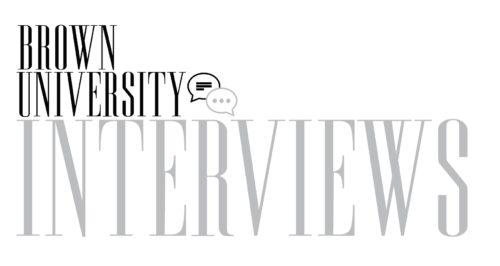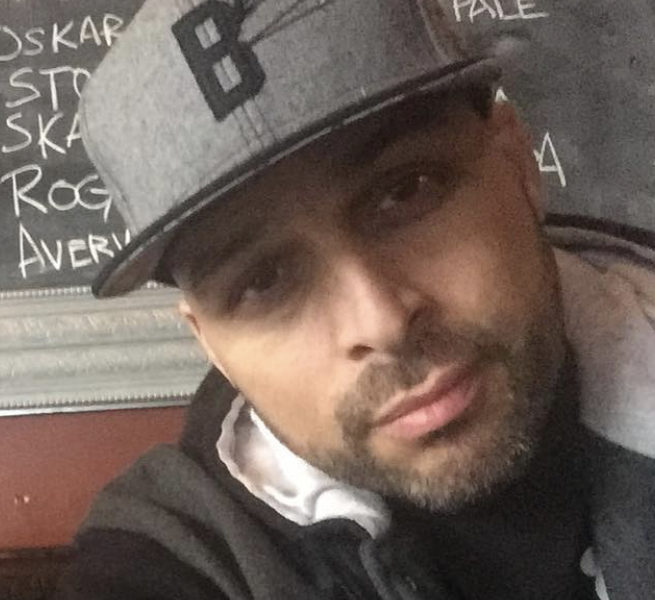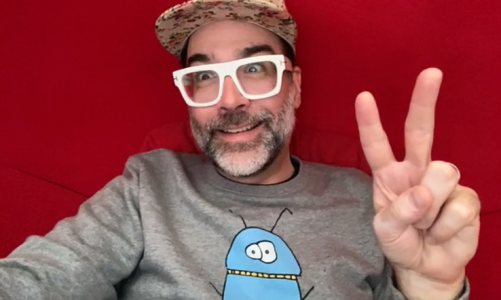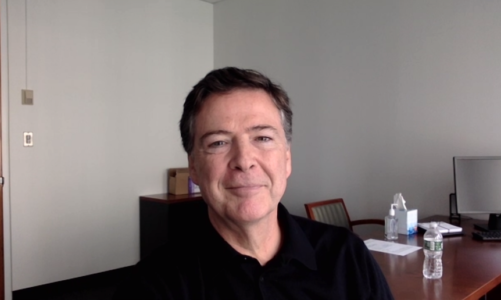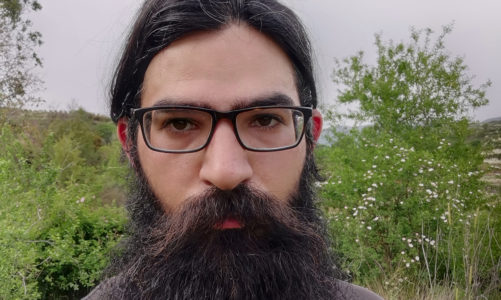
Photo credit: @hierodomino
Damian “Domino” Siguenza, is a producer and DJ from San Francisco. He got his start while living in the back of the Groove Merchant record store where he met musician Del the Funky Homosapien; Del soon invited him to join underground hip-hop collective Hieroglyphics. He rose to fame alongside the now critically acclaimed group and was acting CEO for their label Hiero Imperium from 1997 to 2006. Domino’s music has been featured in commercials, video games, and TV shows. His albums appear on Billboard Heatseekers, Billboard 200, and Top R&B/Hip Hop charts.
Amelia Spalter: You were almost a sports journalist instead of a musician. What convinced you to risk it all for music instead of taking that safer path?
Domino: I’m hella into sports, and I used to really be into the announcers like Bob Costas and their different styles, so I started going to college for sports journalism. But at the same time, I still had this massive love for music and I would make beats on the side. I had the opportunity to do an internship at a music show, but I was in college and working in construction, and I couldn’t do all three. I was living at home at the time, so I spoke to my mom about it, and she said, “You can do whatever you want. Just don’t make any bills for me.” Those were her exact words. So, I said, “I guess I’m keeping the job.”
No doubt that was the right call, because even when you were watching sports, you were focused on the music. You’ve said that one of your top 10 favorite albums of all time is the old NFL Films soundtrack. Why that album, of all the music out there?
ESPN, in its early days, didn’t program any live events. They didn’t have the rights to the NFL or NBA, none of that. So they used to show a lot of old NFL films, kind of like highlight clips of the week, that weren’t just a replay of the game but were edited to have narration and music. I was always taken by the music, especially the drama of the music in connection with the action they were showing; the way it accented the long runs, the slow-motion plays, and things like that. I became obsessed with these NFL films in order to hear the music, because at that time I didn’t have records of it. It wasn’t until much later that I realized you could buy the music composed for the films.
As someone whose beats are highly sought after, how do you spot rappers who are worthy of your product, and how do you suggest young producers determine whom to collaborate with?
It’s hard now because there is a glut of rappers, but there aren’t many who grab you. There’s not really one way to go about connecting with somebody. Nowadays, people will often forward you a YouTube clip or Bandcamp page, but some people still say, “Hey, I want to give you some music,” and you listen to it and it sticks with you. There’s really no rhyme or reason about it. Some dudes just have the charisma and lyrical talent that jumps out at you, some guys don’t. I mean, really, most don’t. It’s just the luck of the draw to come across the right person at the right time. Music’s changing, so much of it is harder now. There was a time that being skilled lyrically was a big part of being a rapper and that’s not the case as much anymore. I still hold to that aesthetic, because it’s hard for me to embrace somebody just because they have a good hook or they’re catchy. People who are really honing their craft and actually putting a lot of work into their lyrics are few and far between, but that’s what I’m attracted to.
Have you noticed any common traits among artists who break in today, besides being catchy?
Now everything is about saying something catchy. Look, I realize how music works, and that the way to be successful is to have music that’s memorable and catchy. A lot of success has nothing to with properly expressing the art form. So, I don’t begrudge anybody who feels that the way to become successful is to make a song that the lowest common denominator can understand. There’s nothing wrong with that. But now, because it’s more about the beat and saying something catchy, it isn’t about actual skill. Honestly, most songs that I hear nowadays, it sounds like their guy’s been rapping for six months.
I’m not trying to sound like the old, angry, “Get off my lawn” guy, but you know what I mean? It’s like they’re not into the cadence of the rhythm. That’s music now, that’s just how it’s morphed, and I have to accept it. What’s popular nowadays is to have that continuous thing with the beat that’s heavy on 808 and sounds good in the club and that you can dance to. It’s actually not really all that different from a lot of the stuff that was popular before, because in our era, the late ’80s and the ’90s era, these classic groups weren’t on the radio 24/7 either. Most of the stuff that got exposure wasn’t stuff from the underground anyways, especially in the ’80s and even in the ’90s. It wasn’t until Dre and Bad Boy started to make more melodic hip hop based around choruses and melody that the real stuff started to get on the radio.
When did musical talent stop being a prerequisite for success in the industry, and do you think it’s a permanent change?
The main thing, and this is good and bad, is that it used to be where you had to go through gatekeepers to get your music heard. You had to do a demo, get discovered, and maybe get signed. Then, once you were signed, you had to have your label get you on the radio, get you onto all these mediums through which people found out about you. With the internet, none of that is necessary. Now you can be a kid in your room who just downloaded an app. Another part of it is that you used to have to have some money to be able to access some of this equipment in order to even make a demo. Nowadays, you can make beats on your phone, or you can buy someone else’s beats for thirty bucks. So now it’s so easy for people to make songs and get them out there. None of this is a bad thing. It’s direct to the community, right from you, you don’t need to go through all these gatekeepers just to find an audience. That’s a good thing.
But what that has also bred is a culture in which you can catch on with just one hit. Success is no longer based on honing your craft. In order to get a real level of success, you used to have to put in time. This is why a lot of rappers’ live shows aren’t as good anymore, because perfecting all those little aspects of your performance before you became successful is no longer as much a part of the process. Nowadays, you don’t have to do any of that, because people can see your music online and the audience isn’t the same as the gatekeepers you used to have to go through. The audience is looking for something that they can relate to really quickly, dance to, and move on from. Music doesn’t last as long anymore. It’s like, “Okay, that’s dope. Yeah, really great, wow. Now let’s listen to the next song.” Music doesn’t have as lasting a power as it used to before the internet. Again, I’m not saying that’s all bad, because I think it’s good that you don’t need to go get signed to be able to be heard. But a result is that the bar for what people expect out of the artist isn’t as high anymore.
What is the most memorable testimonial you’ve ever received from a fan about how your music has touched their life?
The tattoos of our logo or of our lyrics is the statement that has the most effect on me. Because you can only put so many tattoos on your body and they’re permanent. So, your music has impacted people strongly enough that they feel it’s important to put it on their body and represent it everywhere they go. There are really a lot of people with our tattoos. If you get a tattoo of our logo, it’s not just you representing us, but us representing you, and that’s an honor. Maybe it’s just that our logo is cool, but ultimately, getting the tattoos speak louder to me than anything anyone’s ever actually said to me about the music. I’ll never stop being humbled by it, because I don’t have a tattoo, and that’s my group that I’m in, you know? A tattoo screams a level of loyalty like nothing else could.
Is the convenience of the internet strengthening or weakening collaboration in music?
There’s something you lose when you’re not in a room with somebody going through the whole process. Not just like, “Hey, I made a beat, I sent it to you.” “Cool, just sent you back the verse.” When I hear about something like that, the thoughts that go through my mind as a producer, and I don’t just mean a beatmaker, I mean an actual producer— so look, a real producer doesn’t just make the beat and call it a day. A real producer oversees the entire process. In hip hop, it did kind of start where the producer was just a guy who made the beat, so both definitions are true in hip hop, that’s the beauty of it. But I come from a background of producing where, whether or not I made the beat, I still had input on how to make the song better.
For instance, on 93 ’Til Infinity I only made about four or five songs, but I was still there every single day. I had an impact on what tracks we used and how they kick their raps over songs, whether or not I had anything to do with that particular beat. That’s true producing, and that’s the kind of thing you lose when you’re just sending beats to people online. Basically, the artist is just producing themselves, and there’s nothing wrong with that in and of itself, but a good producer can really add a lot. What’s lost is that collaborative effort, because when you have multiple people bringing their different talents in a room together, you’re able to get more out of a track because you’re bouncing things off of each other on the fly as stuff’s getting made. That goes for both sides, because when the producer and the rapper aren’t together, the rapper can’t influence how the beat would play or how a breakdown would go or anything like that. It makes music easier, sure, but it doesn’t necessarily make it better.
What new things are you hearing that get you excited for the future of music?
There’s a lot of the aesthetic of early hip hop that’s coming back into vogue. I don’t want to sound like that’s the only reason it’s good, because it is totally new, it just sounds old. There’s a lot of guys out there now who are pushing for a little but more of a grittier sound. And samples, or at least the feel of samples, are coming back. But like I said, even though it sounds old, it’s really new, because cats are putting their own twist on it. Like Griselda, a lot of the stuff that Alchemist is working with, French Montana, there’s tons of cool artists. There’s a lot of dudes out there that have some of the aesthetic I think is cool, but also are doing it their way, making it new. You can’t fault a kid who makes music like the stuff that they listen to. You become what your influences are.
I’ve never had a problem with what was on the radio and what was commercial; my problem was always that they didn’t give options. You listen to the radio, or you listen to what gets popular, and it’s a lot of the same type of stuff. I always felt like, “I don’t mind this, but I wish they would play a little bit of underground stuff or a little bit of something political or even just something uplifting.” Then people could choose what they love instead of having their tastes beaten down by the same styles, the same formulas, that are at work all the time. With the internet, it became easier to get all those different flavors. But now it’s oversaturated, so they’re becoming harder to find again. The older rap skill aesthetic is slowly starting to make its way back, which is why people revere the ’90s. There’s even a pool of younger dudes who listen to a lot of ’90s stuff because it’s hip again. It’s good to see that effect on a new generation, you know?
What song do you recommend everyone listen to right now?
I’m going to go a little bit more old and obscure. “Hanging On in There” by Mike James Kirkland. I’d say put it on your playlist due to the times.
Do you think the events of 2020 will be a catalyst for politically charged music to dominate the mainstream, or will people be so overwhelmed by reality that they’ll seek escape?
What’s going on in the world, and especially in the United States right now, is going to spring a lot more political music. That’s the climate right now, it’s one in which people feel that they need to speak out. For the average person it might be just ranting on Twitter, but the artist is going to go, “Man, we need to talk about this. I need to make some music that speaks to this.” I guarantee you that there’s going to be a lot more music that is political, whether that manifests as uplifting or combative, coming out of this situation we’re in right now.
Art is a reflection of society, so most artists, whether it’s musicians or painters or even television writers, create things that reflect their time. If you look back to any historical event, you can find movies about it, you can find art about it, and you can definitely find music about it. That is what always happens, so that is what is going to happen again, and that is a good thing. Art about the uprising is a way in. Music moves in waves, and recently everyone was on, “Hey, it’s about money and what you have and how much of it you have.” Now people are starting to shun that because, going forward, they want to talk about things that are a little bit deeper. I mean, there always will be your ignorant stuff and lowest-common-denominator type of music. But there will also always be brilliant art that emerges from struggle.
Do you think the surge of politically relevant music will mostly occur in the underground spaces where it’s historically thrived, or will it become a standard part of pop culture?
I think it will be on the radio and in the mainstream because of the pressure on popular culture’s institutions. Even the corporations are making public statements, because at this moment in time, you’re either with us or you’re against us. People are saying, “Hey, these are human rights that we’re talking about.” You can’t be silent anymore. Silence is complicity. Corporations are about money, so the last thing they want is to seem like they’re falling behind on the movement. It’s the same on the radio. They’re going to be pushing more things that are speaking out, not because they changed as an institution, but because that’s what the climate is demanding of them. People, businesses, celebrities, anyone who’s usually passive about political things for the most part is now like, “Fuck that. This ain’t right.”
Ultimately, this attitude might not catch on forever, but in the immediate future there is going to be some mainstream support for stuff that pushes the envelope because there is such intense backlash against the alternative. For instance, people are often like, “Well, I don’t want to speak out about this political issue because it’s going to hurt the brand. It’s going to create this problem or that issue.” But, again, you can’t be silent anymore. As polarizing a political climate as we have in the United States right now, there really aren’t many people saying that George Floyd deserved to die the way he did. Even on Fox News they’re saying, “That was wrong.” I’m not trying to make anything red versus blue, I’m just saying that even pro-police people are stepping back like, “Well… That was wrong.” Some pro-police people are even actively choosing to speak out right now because it’s at a point where it’s so obvious, beyond that, it’s so outrageous, so egregious, what occurred. So those people worried about “Having a stance on this issue will hurt the brand” are realizing that they’ll face less backlash if they take the right side of history than if they take no side at all.
Since even paid streaming platforms typically generate little to no money for musicians, in what other ways should fans support artists?
If my music touches you, if any artist’s music really touches you, then go see if they have merchandise you can buy and go to their shows when concerts are happening again. I get why people stream their music, but you’ve got to show support in other ways, or we won’t make any money, you know what I mean? Think of it this way, you’ve got to tip your waitress because the tips are really how they make a living wage. It works the same way with tickets and merchandise for artists. They might not be able to live off the money the music brings in by itself. In a lot of cases these other means of support may be the only way that person is able to continue doing their art.
I don’t mind that people first find out about me through free or practically free media. I say ‘practically’ because we make about one third of a cent every time you stream our music, even if you pay a fee for the streaming service. But when there are systemic changes of that scale we have to grow with them, so we’re long past fighting that. So if you habitually listen to something or if it truly touches you, if you’re like “Man, this brings me back to that feeling,” or “This gets me through my day,” then support those artists in other ways. Buy their merchandise and tickets and be sure to buy them on their website and on platforms where you know it’s really them who are receiving the money.
People are used to getting music for next to nothing, so I understand that not everyone has the budget to spend money on music. But you don’t have to spend money, just telling other people about that artist is a form of support. Share the music online, play it for your friends, write about it – at least that way you show that what we do matters to you and it’s more than something you just listen to in the background. That’s meaningful to us. Artists are in a really tough spot, especially now that there are no live shows. If someone’s music has helped you through things, put your money where your mouth is. Go to their website right now and help them back.
*This interview has been edited for length and clarity.
